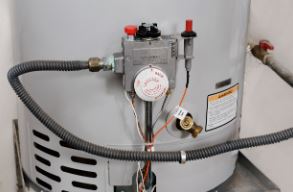Does Cold Weather Affect a Hot Water Heater? Your Guide to Winter Prep

As the seasons change and temperatures drop, nothing feels better than stepping into a hot shower. But here's the question: Does cold weather affect a hot water heater?
The answer is yes—and understanding how may help you avoid higher energy bills, lukewarm showers, or even frozen pipes.
How Cold Weather Impacts Your Water Heater
As outside temperatures drop, your water supply line delivers colder water into your system. This means your water heater must work harder and longer to deliver the same results. This can sometimes lead to extra strain on your system, and potential breakdowns. So, how can you prepare your water heater for winter? Let's take a look.
Types of Water Heaters and Winter Concerns
Most homes rely on one of three systems to keep their homes cozy:
Traditional Tank Heaters – Store and continuously heat water, but they can lose heat through the tank and connecting pipes.
Tankless Water Heaters – Heat water on demand, but in winter, the heating element may run longer, increasing energy use.
Boilers – Provide hot water or steam to heat your home, but frozen supply lines or condensate pipes can cause malfunctions.
But that's not all. Other problems that could arise include:
- Frozen or burst pipes
- Frozen water lines
- Inconsistent or lukewarm water
- Reduced lifespan of the system
- Higher-than-normal energy bills
- Emergency plumbing calls (often at the most inconvenient time)
- Reduced efficiency
- Potential leaks or damage if parts freeze
So, what should a homeowner do? The answer is simple—Prepare your water tank before winter to safeguard it all season.
How to Prepare Water Heater for Winter
Now that you know a water heater can freeze in cold weather, you'll want to take precautions. Our pros at Blue Dot have compiled a simple "water heater freeze prep" checklist to prepare your system.
Keep this list handy and refer to it each fall/winter.
- Schedule an inspection: Booking your furnace tune-up? Include your water heater checkup at the same time.
- Flush the Tank: A tank flush removes sediment buildup that can cause rumbling noises and helps reduce efficiency.
- Check Pressure Relief Valve: Ensure your system isn't at risk of dangerous pressure buildup.
- Insulate the Tank & Pipes: Visit your local hardware store and invest in a water heater blanket or pipe insulation to help prevent heat loss.
- Check the Anode Rod: This rod attracts corrosion-causing minerals and helps extend the tank's life. (Ask a professional.)
- Adjust the Temperature: Keep it at 120°F for energy efficiency and safety.
- Seal Drafts Around the Heater's Location: Especially if it's in a garage, basement, or crawlspace.
How a Professional Can Help
While homeowners can do small things like lowering the thermostat or adding water heater blankets, a professional plumber can:
- Perform a full flush and sediment removal
- Inspect the anode rod and pressure relief valve
- Test safety systems and gas/electric connections
- Winterize outdoor tankless units
- Spot minor issues before they turn into costly emergencies
Call Blue Dot for Winter Weather Prep
Now that you know cold weather can affect your water heater, it's time to be proactive. A little prep now, along with professional service, can help you avoid surprise breakdowns, higher utility bills, cold showers, and frozen pipes this winter.
Call Blue Dot today at 410-204-2662 to schedule your water heater checkup!
